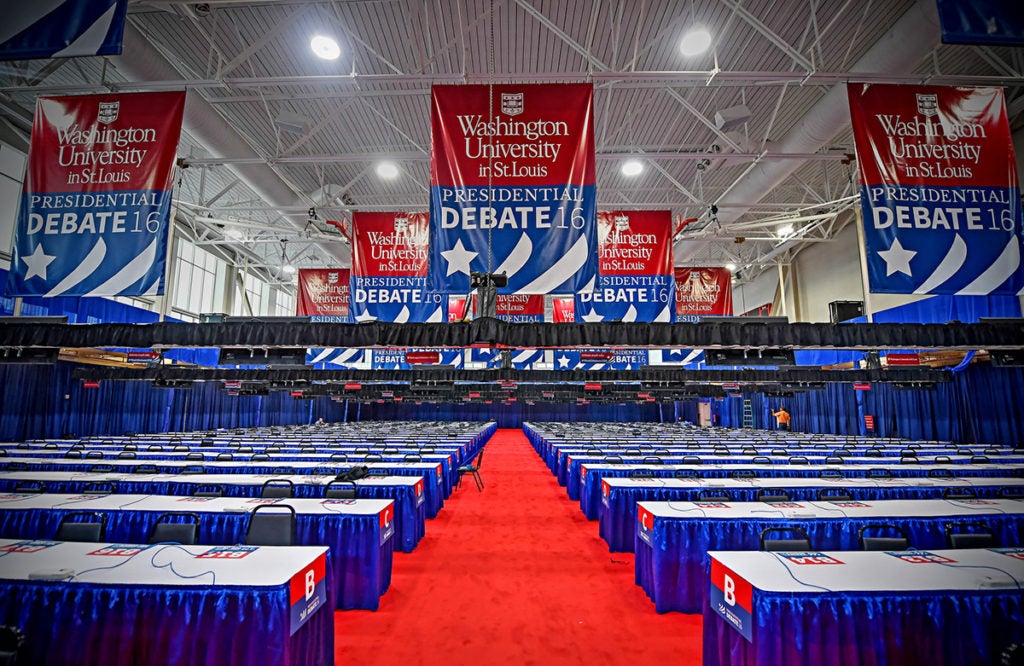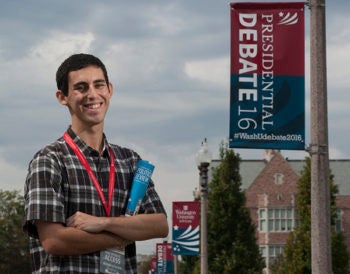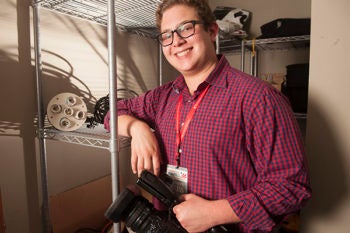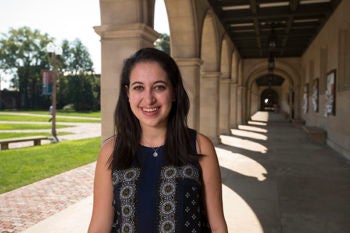
Members of student media at Washington University are among the thousands credentialed to cover the presidential debate Oct. 9.
While reporting live from a presidential debate may seem a daunting challenge for a student journalist, the students from Student Life, WUPR and WUTV seem to have it covered, bringing creative approaches, fresh angles, and a remarkable enthusiasm to their efforts. They also offer a unique student perspective that adds depth to the overall story of the debate.
Each of these student groups will have representatives in Debate Hall’s Spin Alley, with the same credentials as the national and international media covering the debate. “I can’t really put into words how excited I am to see behind the scenes of something most people will never get to see: how the news becomes the news,” said David Gumins, a senior in Olin Business School and executive producer of WUTV, WashU’s student-run TV station. “And most people will never be able to meet a room full of the most successful media in the world.”
While these student journalists have prepared for their debate coverage for months, the reality of reporting on such a huge event is just starting to sink in.
“Never in a million years did I think I’d get to cover such a national event. I knew it was coming, but it hasn’t felt real until the past couple of weeks, as the security gate began to go up and people started showing up,” said Noa Yadidi, Student Life editor-in-chief.
In terms of understanding the debate’s impact on campus, the student perspective is invaluable. Student Life, WUPR, and WUTV will help bring the WashU debate experience to life for audiences, providing a student-focused context that few other media outlets can offer.
Student Life, Washington University’s student-run newspaper, is offering unique content exploring how the debate is impacting the university. “That’s what’s going to make people come read it from us and not from The New York Times,” Yadidi said.
To gain better insight into what’s on students’ minds, Student Life sent out a survey to the student population about election preferences and where students stand on some major issues such as gun control, racial justice and immigration.
In Thursday’s special debate double-issue, the survey results were published. Among the many notable results, 95 percent of eligible student voter respondents are registered, and nearly all plan to vote. The issue also came with a debate bingo card for students to play along during the debate.
Student Life will have two reporters and a photographer in the Athletic Complex during the debate, with other staffers across campus. The paper also plans to share the vibe on campus via Facebook Live and Snapchat.
“I have friends and family all over the country messaging me and calling me asking what it’s like to report on the debate,” Yadidi said. “I don’t think even I understand just how lucky I am, how much of an opportunity this is.”
The staff of the Washington University Political Review (WUPR), the university’s premier undergraduate political magazine, also has big plans for the debate. In addition to co-sponsoring lead-up events and student viewing parties, WUPR is planning an election issue and another featuring its debate coverage.

Sam Klein, co-editor of the Washington University Political Review (Photo: Sid Hastings/Washington University)
Co-editor-in-chief Sam Klein will be in the Spin Room during the debate, offering his insights on what’s happening inside. “How to stand out from the crowd, the pace of covering the news, and the structure of how these organizations set up in the field really interests me. I like to see what news organizations choose to cover, intentionally or unintentionally, and see how other students respond to this as well.”
Although editorially nonpartisan, WUPR is passionate about one thing: getting students to vote.
“You have no right to complain about the way politics are happening in this country if you’re an eligible voter and you don’t vote,” Klein said.
As for the debate itself, Klein observed: “A lot is at stake.”
“We’ll get to see their temperament in a setting where their guard has to be let down because they’re addressing a member of the St. Louis community.”
Look for WUPR’s coverage on social media, and keep an eye out for their upcoming election and debate issues online.

David Gumins, executive producer of WUTV (Photo: Sid Hastings/Washington University)
WUTV, having moved from a TV-station format to a fully digital platform in recent years, will approach the debate primarily through the channel’s WashU News show. WUTV Executive Producer David Gumins has been looking forward to this opportunity for a long time: “I’ve been working the angle to get involved since last year when the debate was announced, laying the groundwork to get the organization through all the hoops — passing credentials, communication with the CPD and Public Affairs… Yesterday I toured the venue, so it’s almost a dream come true.”
Gumins, who is also credentialed for the debate venue, is approaching the debate from a unique perspective. “Our focus in the hall is ‘what is it like to have the world’s media spinning things?’ We’re going to focus on the process, the media, how things are covered; instead of turning the camera on the surrogate, pan the camera around the room, see the mob of people, learn about the media perspective,” Gumins said.
Right here in St. Louis …
The unique opportunity to cover the debate is not only meaningful to these students personally, but they believe it is also positive for the university. “It’s definitely made our campus more politically engaged, and that’s a good thing,” Yadidi said.
“This is going to be a really cool experience for anyone who loves to be part of something greater than themselves,” Gumins said. “At the end of the day, we as students get to be part of a world event on the world stage, and that’s something you don’t get to do every day.”
